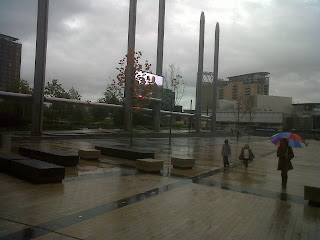I wanted to go for two reasons: I had memories of hope for the Salford docks from my university days, reignited when I heard former BBC Director General Greg Dyke talking at last year's London Policy Conference about why he insisted on shifting part of the BBC -- and its programming department (aka the folks with money) up to Manchester. But it was also because I grew up with a tapesty hanging in my grandparents Huddersfield home of folks going to work and I wanted to see it for myself at the Lowry arts centre.
The Peel Group, who own Media City land, and the local authorities have done everything right according to the cluster policy guidebook. The transport is excellent: a modern tram whisks you there from Manchester City Centre in minutes, a fact hammered home in much of the promotional material. There's a waterside location, and not one but two museums (including The Imperial War Museum, with a fantastic view from the roof), each in signature Guggenheim-esque style (even if the architecture has been criticised). They've scored a prestigious client in the BBC, whose money and pretige is likely to attract supplier firms to settle in the area. ITV is even relocating the entire set of Coronation Street. There's a shopping centre, which was reasonably busy on a wet Sunday, even if the art gallery staff moaned about the choice of shops (mainly discount designer - we stocked up on Molton Brown). A few restaurants, mainly chains, cling onto the shops, and if you eat in them you can park for free for six hours. The security staff in the BBC buildings are friendly and knowledgeable, happy to talk you through recent changes, and those still to come. If that weren't enough, Manchester United football grounds are 10 minutes walk away.
Still, it's a very different fish to the gritty urban grain of London's Tech City. With so much going for it (and prices for a waterside loft much cheaper than anything I could imagine in London), Media City has got to be a success, of sorts. But the creative vibe that people told us they valued so much in inner East London is, for the moment at least, missing.
The Peel Group, who own Media City land, and the local authorities have done everything right according to the cluster policy guidebook. The transport is excellent: a modern tram whisks you there from Manchester City Centre in minutes, a fact hammered home in much of the promotional material. There's a waterside location, and not one but two museums (including The Imperial War Museum, with a fantastic view from the roof), each in signature Guggenheim-esque style (even if the architecture has been criticised). They've scored a prestigious client in the BBC, whose money and pretige is likely to attract supplier firms to settle in the area. ITV is even relocating the entire set of Coronation Street. There's a shopping centre, which was reasonably busy on a wet Sunday, even if the art gallery staff moaned about the choice of shops (mainly discount designer - we stocked up on Molton Brown). A few restaurants, mainly chains, cling onto the shops, and if you eat in them you can park for free for six hours. The security staff in the BBC buildings are friendly and knowledgeable, happy to talk you through recent changes, and those still to come. If that weren't enough, Manchester United football grounds are 10 minutes walk away.
Still, it's a very different fish to the gritty urban grain of London's Tech City. With so much going for it (and prices for a waterside loft much cheaper than anything I could imagine in London), Media City has got to be a success, of sorts. But the creative vibe that people told us they valued so much in inner East London is, for the moment at least, missing.


No comments:
Post a Comment